The Practical Application of Culture Theory: Bogota, Colombia Report
VerifiedAdded on 2022/12/12
|9
|2873
|309
Report
AI Summary
This report delves into the practical application of culture theory, specifically focusing on Bogota, Colombia. It begins with an introduction to culture and its significance, followed by an explanation of Geert Hofstede's cultural dimensions model, which includes power distance index, individualism, masculinity versus femininity, uncertainty avoidance index, long or short term orientation, and indulgence versus restraint. The main body of the report applies this model to analyze and compare the cultures of Colombia and the United Kingdom, highlighting key differences and similarities across these dimensions. The report examines the implications of these cultural differences for business and organizational practices, offering potential solutions to challenges that may arise. Finally, the report concludes by summarizing the key findings and emphasizing the importance of understanding cultural nuances for effective cross-cultural interactions and management. The report uses references to support the findings and analysis.
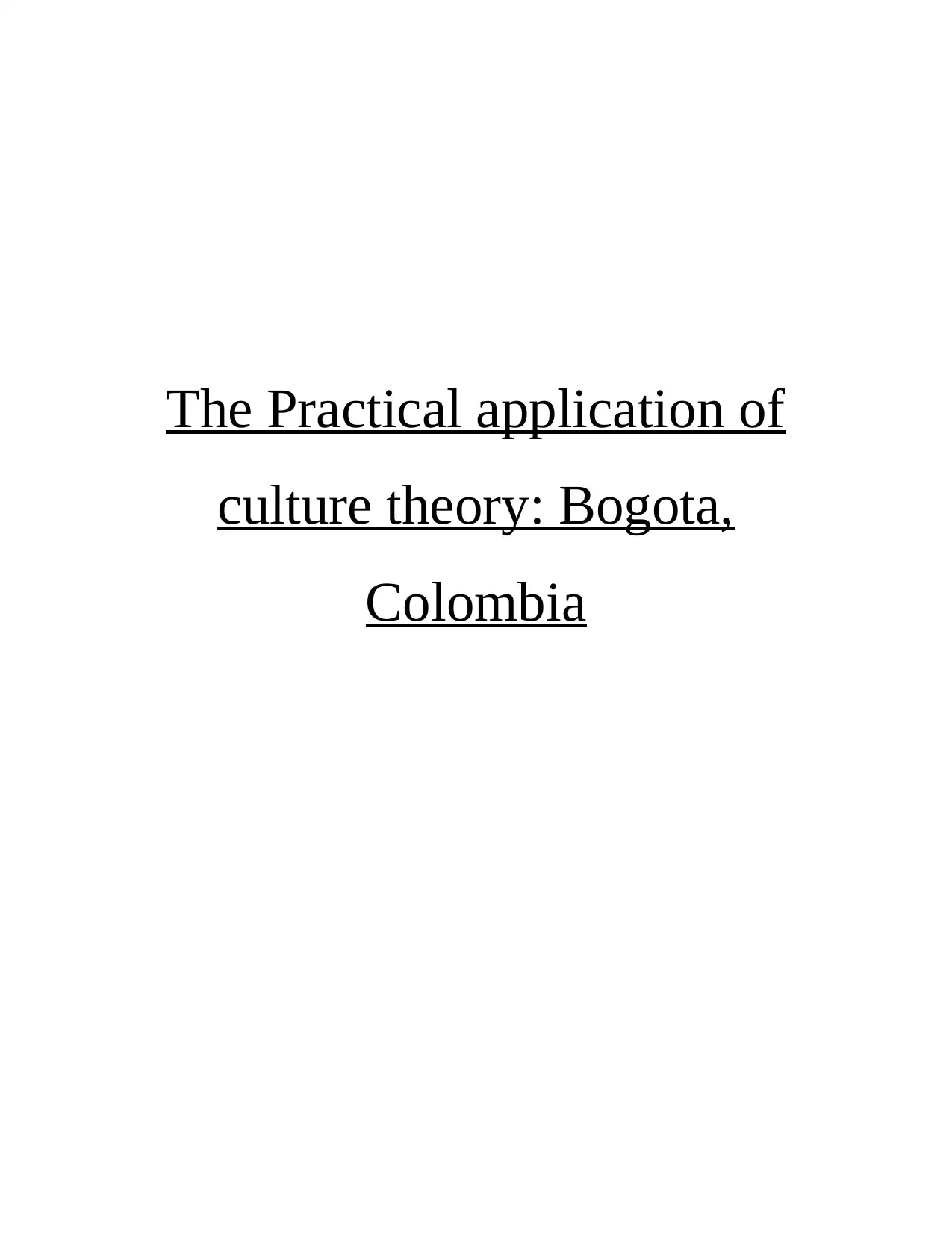
The Practical application of
culture theory: Bogota,
Colombia
culture theory: Bogota,
Colombia
Paraphrase This Document
Need a fresh take? Get an instant paraphrase of this document with our AI Paraphraser
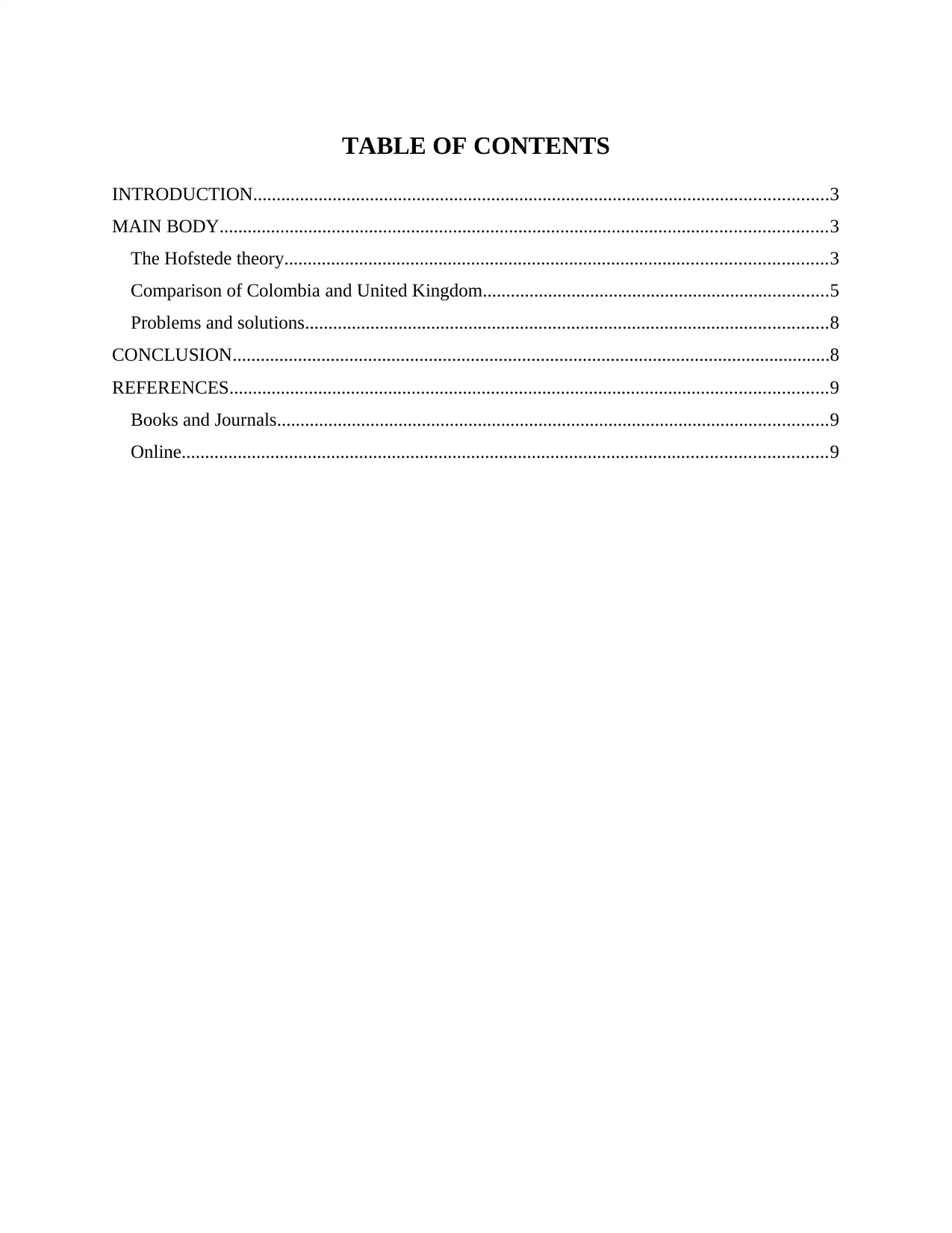
TABLE OF CONTENTS
INTRODUCTION...........................................................................................................................3
MAIN BODY..................................................................................................................................3
The Hofstede theory....................................................................................................................3
Comparison of Colombia and United Kingdom..........................................................................5
Problems and solutions................................................................................................................8
CONCLUSION................................................................................................................................8
REFERENCES................................................................................................................................9
Books and Journals......................................................................................................................9
Online..........................................................................................................................................9
INTRODUCTION...........................................................................................................................3
MAIN BODY..................................................................................................................................3
The Hofstede theory....................................................................................................................3
Comparison of Colombia and United Kingdom..........................................................................5
Problems and solutions................................................................................................................8
CONCLUSION................................................................................................................................8
REFERENCES................................................................................................................................9
Books and Journals......................................................................................................................9
Online..........................................................................................................................................9
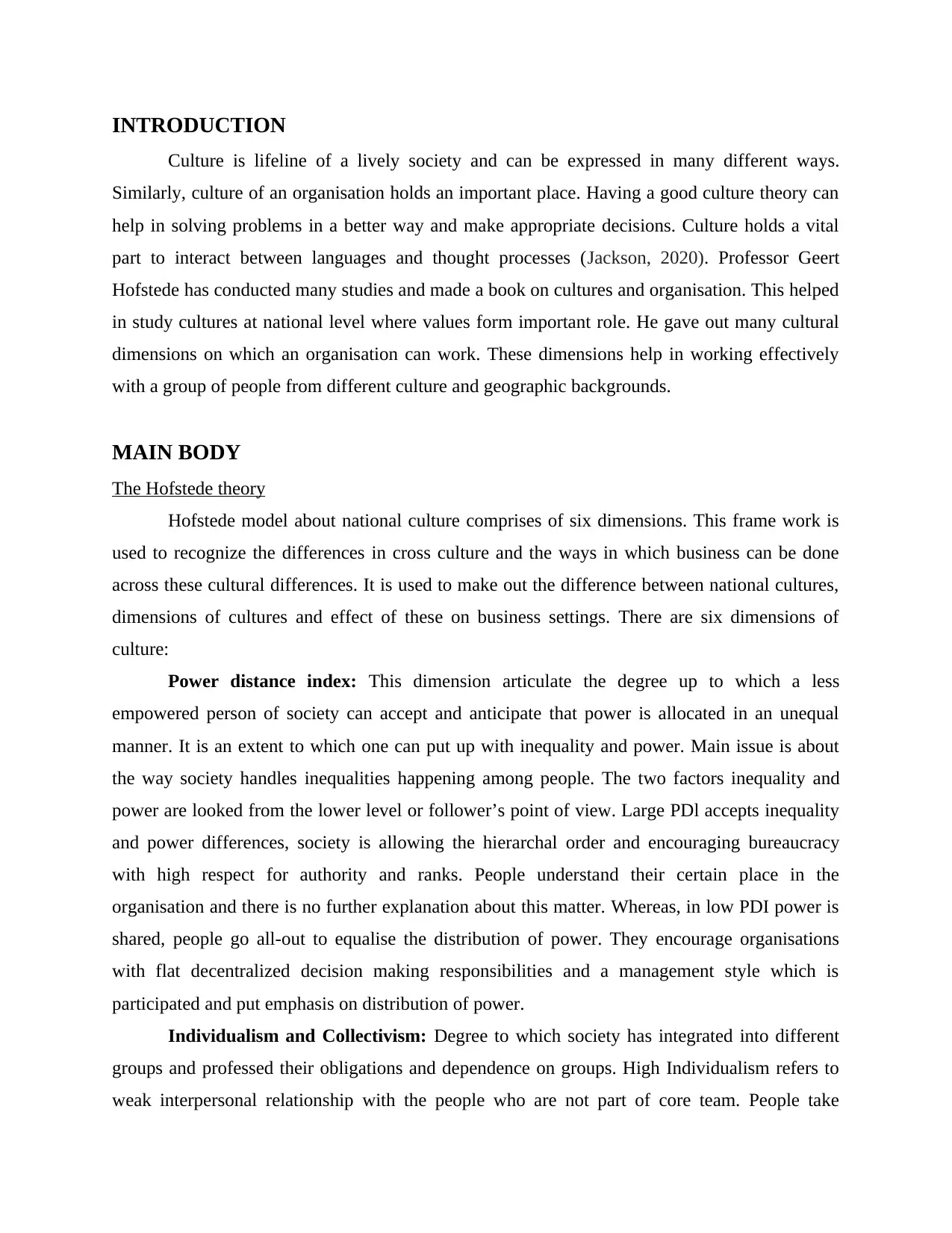
INTRODUCTION
Culture is lifeline of a lively society and can be expressed in many different ways.
Similarly, culture of an organisation holds an important place. Having a good culture theory can
help in solving problems in a better way and make appropriate decisions. Culture holds a vital
part to interact between languages and thought processes (Jackson, 2020). Professor Geert
Hofstede has conducted many studies and made a book on cultures and organisation. This helped
in study cultures at national level where values form important role. He gave out many cultural
dimensions on which an organisation can work. These dimensions help in working effectively
with a group of people from different culture and geographic backgrounds.
MAIN BODY
The Hofstede theory
Hofstede model about national culture comprises of six dimensions. This frame work is
used to recognize the differences in cross culture and the ways in which business can be done
across these cultural differences. It is used to make out the difference between national cultures,
dimensions of cultures and effect of these on business settings. There are six dimensions of
culture:
Power distance index: This dimension articulate the degree up to which a less
empowered person of society can accept and anticipate that power is allocated in an unequal
manner. It is an extent to which one can put up with inequality and power. Main issue is about
the way society handles inequalities happening among people. The two factors inequality and
power are looked from the lower level or follower’s point of view. Large PDl accepts inequality
and power differences, society is allowing the hierarchal order and encouraging bureaucracy
with high respect for authority and ranks. People understand their certain place in the
organisation and there is no further explanation about this matter. Whereas, in low PDI power is
shared, people go all-out to equalise the distribution of power. They encourage organisations
with flat decentralized decision making responsibilities and a management style which is
participated and put emphasis on distribution of power.
Individualism and Collectivism: Degree to which society has integrated into different
groups and professed their obligations and dependence on groups. High Individualism refers to
weak interpersonal relationship with the people who are not part of core team. People take
Culture is lifeline of a lively society and can be expressed in many different ways.
Similarly, culture of an organisation holds an important place. Having a good culture theory can
help in solving problems in a better way and make appropriate decisions. Culture holds a vital
part to interact between languages and thought processes (Jackson, 2020). Professor Geert
Hofstede has conducted many studies and made a book on cultures and organisation. This helped
in study cultures at national level where values form important role. He gave out many cultural
dimensions on which an organisation can work. These dimensions help in working effectively
with a group of people from different culture and geographic backgrounds.
MAIN BODY
The Hofstede theory
Hofstede model about national culture comprises of six dimensions. This frame work is
used to recognize the differences in cross culture and the ways in which business can be done
across these cultural differences. It is used to make out the difference between national cultures,
dimensions of cultures and effect of these on business settings. There are six dimensions of
culture:
Power distance index: This dimension articulate the degree up to which a less
empowered person of society can accept and anticipate that power is allocated in an unequal
manner. It is an extent to which one can put up with inequality and power. Main issue is about
the way society handles inequalities happening among people. The two factors inequality and
power are looked from the lower level or follower’s point of view. Large PDl accepts inequality
and power differences, society is allowing the hierarchal order and encouraging bureaucracy
with high respect for authority and ranks. People understand their certain place in the
organisation and there is no further explanation about this matter. Whereas, in low PDI power is
shared, people go all-out to equalise the distribution of power. They encourage organisations
with flat decentralized decision making responsibilities and a management style which is
participated and put emphasis on distribution of power.
Individualism and Collectivism: Degree to which society has integrated into different
groups and professed their obligations and dependence on groups. High Individualism refers to
weak interpersonal relationship with the people who are not part of core team. People take
⊘ This is a preview!⊘
Do you want full access?
Subscribe today to unlock all pages.

Trusted by 1+ million students worldwide

responsibility for output of actions of others. This dimension being higher means loose social
framework where individuals take their own care and families (Taras, 2017). Greater
significance is placed on personal growth and achieving personal goals, there is more ‘I’ in this
dimension. In a collectivist society people are expected to be loyal to their group and they will
defend their interest in return. Groups are large in quantity and everyone takes accountability for
well being of each and everyone. Self image of people here is more ‘we’.
Masculinity versus Femininity: Also known as tough versus tender and is based on the
preference of the society for achieving attitude in the direction of sexual equality and behaviour.
It refers to allocation of roles and responsibilities between men and women. In masculine
society, men are supposed to behave assertively and there is no overlapping and confusion in
roles of men and women. Showcasing one’s success and handling things in strong and fast way
are considered as positive characters. Femininity means standing for cooperation, being modest
and caring for feeble and having a quality of life. There is great deal of overlapping between the
roles of male and female. More importance is on having good and healthy relations with
supervisors and working in a cooperative manner.
Uncertainty avoidance index: This shows the degree to which uncertainty and
indistinctness can be tolerated. This dimension shows how society deals with unknown and
unexpected situations. The issue raised here is how society bears the fact that future is never
known, they cannot control their lives and must stop trying for this process and leave the fate in
god’s hand. Countries which have low uncertainty avoidance index are more relaxed and open.
They have high tolerance for ambiguity and more risk taking (Dhaundiyal, Chakravarty and N.
Joshi, 2020). Unknown things are accepted with open hands and lax rules and regulations follow.
Avoiding uncertainty does not mean that they should avoid risk. High Uncertainty avoidance
index means that there are rigid codes in behaviourism and beliefs. They do not tolerate
unorthodox behaviour and ideas. The unknown factor is minimised with strict set of rules and
regulations.
Long or short term orientation: It is the extent to which society outlook the time
horizon. They have to maintain some relations with the past while simultaneously dealing with
the present and future challenges. Countries with long term time orientation are more pragmatic
and modest than the short term countries that place more importance on principles, consistency
and are nationalistic religious. Pragmatic one’s encourage being thrift and puts efforts in modern
framework where individuals take their own care and families (Taras, 2017). Greater
significance is placed on personal growth and achieving personal goals, there is more ‘I’ in this
dimension. In a collectivist society people are expected to be loyal to their group and they will
defend their interest in return. Groups are large in quantity and everyone takes accountability for
well being of each and everyone. Self image of people here is more ‘we’.
Masculinity versus Femininity: Also known as tough versus tender and is based on the
preference of the society for achieving attitude in the direction of sexual equality and behaviour.
It refers to allocation of roles and responsibilities between men and women. In masculine
society, men are supposed to behave assertively and there is no overlapping and confusion in
roles of men and women. Showcasing one’s success and handling things in strong and fast way
are considered as positive characters. Femininity means standing for cooperation, being modest
and caring for feeble and having a quality of life. There is great deal of overlapping between the
roles of male and female. More importance is on having good and healthy relations with
supervisors and working in a cooperative manner.
Uncertainty avoidance index: This shows the degree to which uncertainty and
indistinctness can be tolerated. This dimension shows how society deals with unknown and
unexpected situations. The issue raised here is how society bears the fact that future is never
known, they cannot control their lives and must stop trying for this process and leave the fate in
god’s hand. Countries which have low uncertainty avoidance index are more relaxed and open.
They have high tolerance for ambiguity and more risk taking (Dhaundiyal, Chakravarty and N.
Joshi, 2020). Unknown things are accepted with open hands and lax rules and regulations follow.
Avoiding uncertainty does not mean that they should avoid risk. High Uncertainty avoidance
index means that there are rigid codes in behaviourism and beliefs. They do not tolerate
unorthodox behaviour and ideas. The unknown factor is minimised with strict set of rules and
regulations.
Long or short term orientation: It is the extent to which society outlook the time
horizon. They have to maintain some relations with the past while simultaneously dealing with
the present and future challenges. Countries with long term time orientation are more pragmatic
and modest than the short term countries that place more importance on principles, consistency
and are nationalistic religious. Pragmatic one’s encourage being thrift and puts efforts in modern
Paraphrase This Document
Need a fresh take? Get an instant paraphrase of this document with our AI Paraphraser
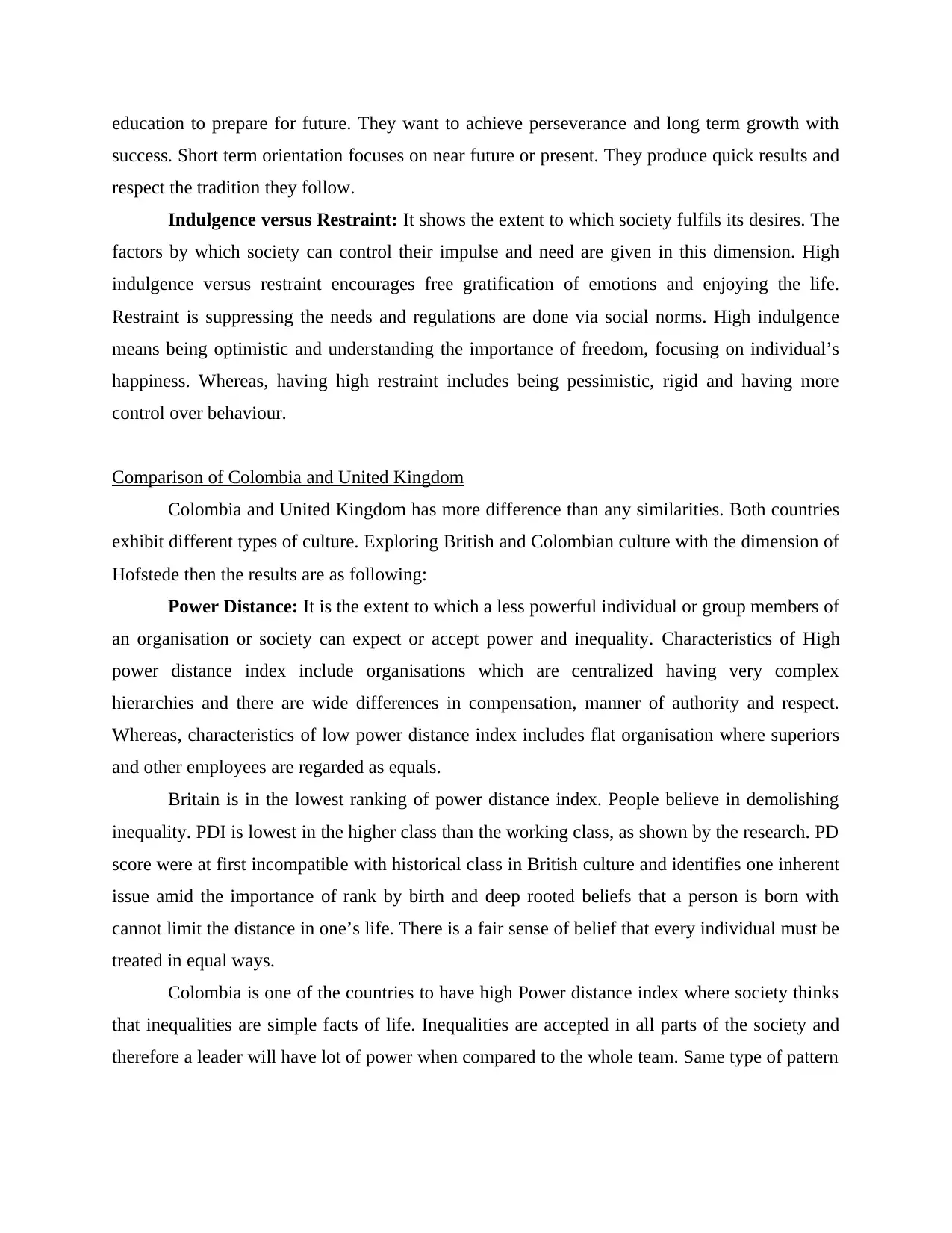
education to prepare for future. They want to achieve perseverance and long term growth with
success. Short term orientation focuses on near future or present. They produce quick results and
respect the tradition they follow.
Indulgence versus Restraint: It shows the extent to which society fulfils its desires. The
factors by which society can control their impulse and need are given in this dimension. High
indulgence versus restraint encourages free gratification of emotions and enjoying the life.
Restraint is suppressing the needs and regulations are done via social norms. High indulgence
means being optimistic and understanding the importance of freedom, focusing on individual’s
happiness. Whereas, having high restraint includes being pessimistic, rigid and having more
control over behaviour.
Comparison of Colombia and United Kingdom
Colombia and United Kingdom has more difference than any similarities. Both countries
exhibit different types of culture. Exploring British and Colombian culture with the dimension of
Hofstede then the results are as following:
Power Distance: It is the extent to which a less powerful individual or group members of
an organisation or society can expect or accept power and inequality. Characteristics of High
power distance index include organisations which are centralized having very complex
hierarchies and there are wide differences in compensation, manner of authority and respect.
Whereas, characteristics of low power distance index includes flat organisation where superiors
and other employees are regarded as equals.
Britain is in the lowest ranking of power distance index. People believe in demolishing
inequality. PDI is lowest in the higher class than the working class, as shown by the research. PD
score were at first incompatible with historical class in British culture and identifies one inherent
issue amid the importance of rank by birth and deep rooted beliefs that a person is born with
cannot limit the distance in one’s life. There is a fair sense of belief that every individual must be
treated in equal ways.
Colombia is one of the countries to have high Power distance index where society thinks
that inequalities are simple facts of life. Inequalities are accepted in all parts of the society and
therefore a leader will have lot of power when compared to the whole team. Same type of pattern
success. Short term orientation focuses on near future or present. They produce quick results and
respect the tradition they follow.
Indulgence versus Restraint: It shows the extent to which society fulfils its desires. The
factors by which society can control their impulse and need are given in this dimension. High
indulgence versus restraint encourages free gratification of emotions and enjoying the life.
Restraint is suppressing the needs and regulations are done via social norms. High indulgence
means being optimistic and understanding the importance of freedom, focusing on individual’s
happiness. Whereas, having high restraint includes being pessimistic, rigid and having more
control over behaviour.
Comparison of Colombia and United Kingdom
Colombia and United Kingdom has more difference than any similarities. Both countries
exhibit different types of culture. Exploring British and Colombian culture with the dimension of
Hofstede then the results are as following:
Power Distance: It is the extent to which a less powerful individual or group members of
an organisation or society can expect or accept power and inequality. Characteristics of High
power distance index include organisations which are centralized having very complex
hierarchies and there are wide differences in compensation, manner of authority and respect.
Whereas, characteristics of low power distance index includes flat organisation where superiors
and other employees are regarded as equals.
Britain is in the lowest ranking of power distance index. People believe in demolishing
inequality. PDI is lowest in the higher class than the working class, as shown by the research. PD
score were at first incompatible with historical class in British culture and identifies one inherent
issue amid the importance of rank by birth and deep rooted beliefs that a person is born with
cannot limit the distance in one’s life. There is a fair sense of belief that every individual must be
treated in equal ways.
Colombia is one of the countries to have high Power distance index where society thinks
that inequalities are simple facts of life. Inequalities are accepted in all parts of the society and
therefore a leader will have lot of power when compared to the whole team. Same type of pattern
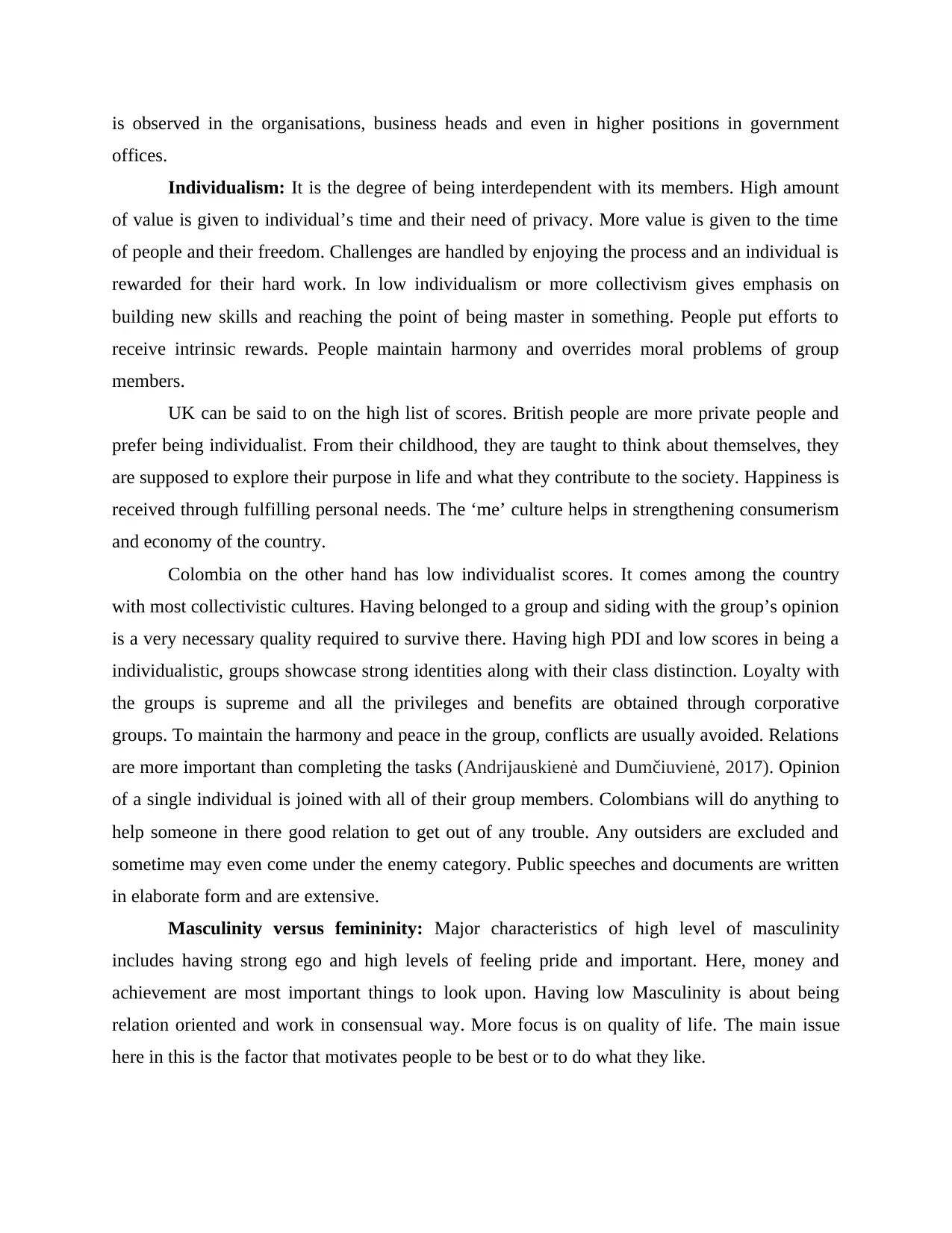
is observed in the organisations, business heads and even in higher positions in government
offices.
Individualism: It is the degree of being interdependent with its members. High amount
of value is given to individual’s time and their need of privacy. More value is given to the time
of people and their freedom. Challenges are handled by enjoying the process and an individual is
rewarded for their hard work. In low individualism or more collectivism gives emphasis on
building new skills and reaching the point of being master in something. People put efforts to
receive intrinsic rewards. People maintain harmony and overrides moral problems of group
members.
UK can be said to on the high list of scores. British people are more private people and
prefer being individualist. From their childhood, they are taught to think about themselves, they
are supposed to explore their purpose in life and what they contribute to the society. Happiness is
received through fulfilling personal needs. The ‘me’ culture helps in strengthening consumerism
and economy of the country.
Colombia on the other hand has low individualist scores. It comes among the country
with most collectivistic cultures. Having belonged to a group and siding with the group’s opinion
is a very necessary quality required to survive there. Having high PDI and low scores in being a
individualistic, groups showcase strong identities along with their class distinction. Loyalty with
the groups is supreme and all the privileges and benefits are obtained through corporative
groups. To maintain the harmony and peace in the group, conflicts are usually avoided. Relations
are more important than completing the tasks (Andrijauskienė and Dumčiuvienė, 2017). Opinion
of a single individual is joined with all of their group members. Colombians will do anything to
help someone in there good relation to get out of any trouble. Any outsiders are excluded and
sometime may even come under the enemy category. Public speeches and documents are written
in elaborate form and are extensive.
Masculinity versus femininity: Major characteristics of high level of masculinity
includes having strong ego and high levels of feeling pride and important. Here, money and
achievement are most important things to look upon. Having low Masculinity is about being
relation oriented and work in consensual way. More focus is on quality of life. The main issue
here in this is the factor that motivates people to be best or to do what they like.
offices.
Individualism: It is the degree of being interdependent with its members. High amount
of value is given to individual’s time and their need of privacy. More value is given to the time
of people and their freedom. Challenges are handled by enjoying the process and an individual is
rewarded for their hard work. In low individualism or more collectivism gives emphasis on
building new skills and reaching the point of being master in something. People put efforts to
receive intrinsic rewards. People maintain harmony and overrides moral problems of group
members.
UK can be said to on the high list of scores. British people are more private people and
prefer being individualist. From their childhood, they are taught to think about themselves, they
are supposed to explore their purpose in life and what they contribute to the society. Happiness is
received through fulfilling personal needs. The ‘me’ culture helps in strengthening consumerism
and economy of the country.
Colombia on the other hand has low individualist scores. It comes among the country
with most collectivistic cultures. Having belonged to a group and siding with the group’s opinion
is a very necessary quality required to survive there. Having high PDI and low scores in being a
individualistic, groups showcase strong identities along with their class distinction. Loyalty with
the groups is supreme and all the privileges and benefits are obtained through corporative
groups. To maintain the harmony and peace in the group, conflicts are usually avoided. Relations
are more important than completing the tasks (Andrijauskienė and Dumčiuvienė, 2017). Opinion
of a single individual is joined with all of their group members. Colombians will do anything to
help someone in there good relation to get out of any trouble. Any outsiders are excluded and
sometime may even come under the enemy category. Public speeches and documents are written
in elaborate form and are extensive.
Masculinity versus femininity: Major characteristics of high level of masculinity
includes having strong ego and high levels of feeling pride and important. Here, money and
achievement are most important things to look upon. Having low Masculinity is about being
relation oriented and work in consensual way. More focus is on quality of life. The main issue
here in this is the factor that motivates people to be best or to do what they like.
⊘ This is a preview!⊘
Do you want full access?
Subscribe today to unlock all pages.

Trusted by 1+ million students worldwide
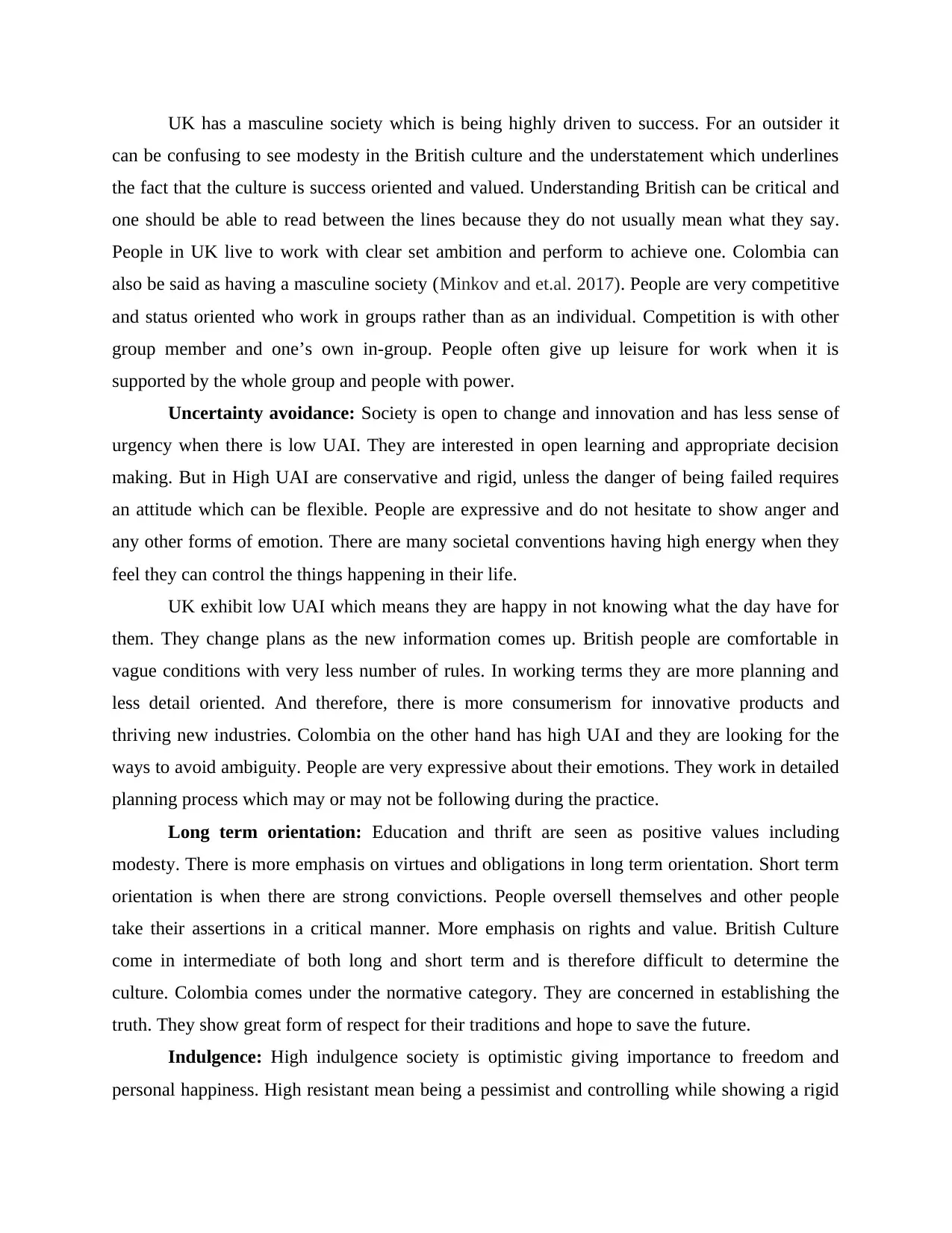
UK has a masculine society which is being highly driven to success. For an outsider it
can be confusing to see modesty in the British culture and the understatement which underlines
the fact that the culture is success oriented and valued. Understanding British can be critical and
one should be able to read between the lines because they do not usually mean what they say.
People in UK live to work with clear set ambition and perform to achieve one. Colombia can
also be said as having a masculine society (Minkov and et.al. 2017). People are very competitive
and status oriented who work in groups rather than as an individual. Competition is with other
group member and one’s own in-group. People often give up leisure for work when it is
supported by the whole group and people with power.
Uncertainty avoidance: Society is open to change and innovation and has less sense of
urgency when there is low UAI. They are interested in open learning and appropriate decision
making. But in High UAI are conservative and rigid, unless the danger of being failed requires
an attitude which can be flexible. People are expressive and do not hesitate to show anger and
any other forms of emotion. There are many societal conventions having high energy when they
feel they can control the things happening in their life.
UK exhibit low UAI which means they are happy in not knowing what the day have for
them. They change plans as the new information comes up. British people are comfortable in
vague conditions with very less number of rules. In working terms they are more planning and
less detail oriented. And therefore, there is more consumerism for innovative products and
thriving new industries. Colombia on the other hand has high UAI and they are looking for the
ways to avoid ambiguity. People are very expressive about their emotions. They work in detailed
planning process which may or may not be following during the practice.
Long term orientation: Education and thrift are seen as positive values including
modesty. There is more emphasis on virtues and obligations in long term orientation. Short term
orientation is when there are strong convictions. People oversell themselves and other people
take their assertions in a critical manner. More emphasis on rights and value. British Culture
come in intermediate of both long and short term and is therefore difficult to determine the
culture. Colombia comes under the normative category. They are concerned in establishing the
truth. They show great form of respect for their traditions and hope to save the future.
Indulgence: High indulgence society is optimistic giving importance to freedom and
personal happiness. High resistant mean being a pessimist and controlling while showing a rigid
can be confusing to see modesty in the British culture and the understatement which underlines
the fact that the culture is success oriented and valued. Understanding British can be critical and
one should be able to read between the lines because they do not usually mean what they say.
People in UK live to work with clear set ambition and perform to achieve one. Colombia can
also be said as having a masculine society (Minkov and et.al. 2017). People are very competitive
and status oriented who work in groups rather than as an individual. Competition is with other
group member and one’s own in-group. People often give up leisure for work when it is
supported by the whole group and people with power.
Uncertainty avoidance: Society is open to change and innovation and has less sense of
urgency when there is low UAI. They are interested in open learning and appropriate decision
making. But in High UAI are conservative and rigid, unless the danger of being failed requires
an attitude which can be flexible. People are expressive and do not hesitate to show anger and
any other forms of emotion. There are many societal conventions having high energy when they
feel they can control the things happening in their life.
UK exhibit low UAI which means they are happy in not knowing what the day have for
them. They change plans as the new information comes up. British people are comfortable in
vague conditions with very less number of rules. In working terms they are more planning and
less detail oriented. And therefore, there is more consumerism for innovative products and
thriving new industries. Colombia on the other hand has high UAI and they are looking for the
ways to avoid ambiguity. People are very expressive about their emotions. They work in detailed
planning process which may or may not be following during the practice.
Long term orientation: Education and thrift are seen as positive values including
modesty. There is more emphasis on virtues and obligations in long term orientation. Short term
orientation is when there are strong convictions. People oversell themselves and other people
take their assertions in a critical manner. More emphasis on rights and value. British Culture
come in intermediate of both long and short term and is therefore difficult to determine the
culture. Colombia comes under the normative category. They are concerned in establishing the
truth. They show great form of respect for their traditions and hope to save the future.
Indulgence: High indulgence society is optimistic giving importance to freedom and
personal happiness. High resistant mean being a pessimist and controlling while showing a rigid
Paraphrase This Document
Need a fresh take? Get an instant paraphrase of this document with our AI Paraphraser
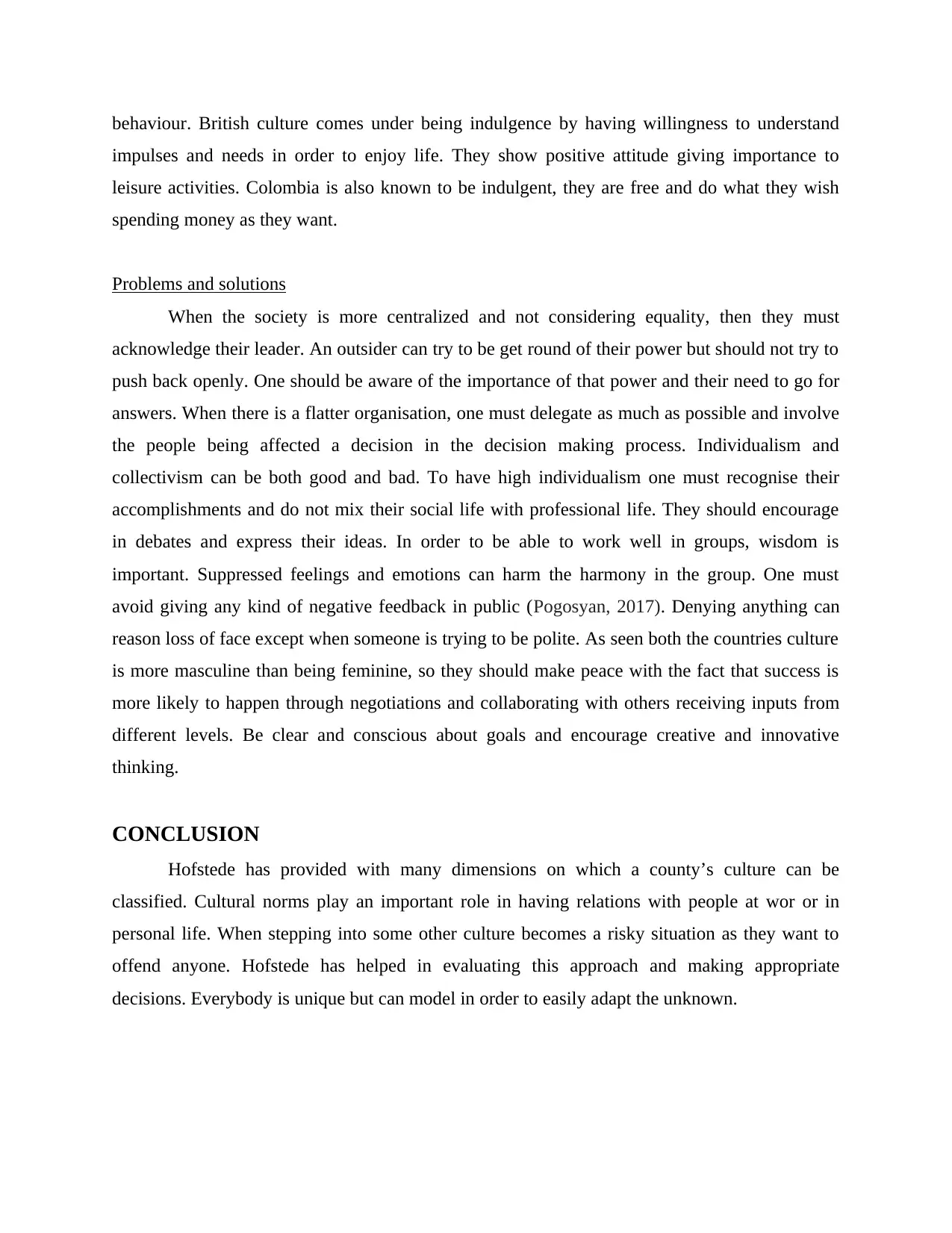
behaviour. British culture comes under being indulgence by having willingness to understand
impulses and needs in order to enjoy life. They show positive attitude giving importance to
leisure activities. Colombia is also known to be indulgent, they are free and do what they wish
spending money as they want.
Problems and solutions
When the society is more centralized and not considering equality, then they must
acknowledge their leader. An outsider can try to be get round of their power but should not try to
push back openly. One should be aware of the importance of that power and their need to go for
answers. When there is a flatter organisation, one must delegate as much as possible and involve
the people being affected a decision in the decision making process. Individualism and
collectivism can be both good and bad. To have high individualism one must recognise their
accomplishments and do not mix their social life with professional life. They should encourage
in debates and express their ideas. In order to be able to work well in groups, wisdom is
important. Suppressed feelings and emotions can harm the harmony in the group. One must
avoid giving any kind of negative feedback in public (Pogosyan, 2017). Denying anything can
reason loss of face except when someone is trying to be polite. As seen both the countries culture
is more masculine than being feminine, so they should make peace with the fact that success is
more likely to happen through negotiations and collaborating with others receiving inputs from
different levels. Be clear and conscious about goals and encourage creative and innovative
thinking.
CONCLUSION
Hofstede has provided with many dimensions on which a county’s culture can be
classified. Cultural norms play an important role in having relations with people at wor or in
personal life. When stepping into some other culture becomes a risky situation as they want to
offend anyone. Hofstede has helped in evaluating this approach and making appropriate
decisions. Everybody is unique but can model in order to easily adapt the unknown.
impulses and needs in order to enjoy life. They show positive attitude giving importance to
leisure activities. Colombia is also known to be indulgent, they are free and do what they wish
spending money as they want.
Problems and solutions
When the society is more centralized and not considering equality, then they must
acknowledge their leader. An outsider can try to be get round of their power but should not try to
push back openly. One should be aware of the importance of that power and their need to go for
answers. When there is a flatter organisation, one must delegate as much as possible and involve
the people being affected a decision in the decision making process. Individualism and
collectivism can be both good and bad. To have high individualism one must recognise their
accomplishments and do not mix their social life with professional life. They should encourage
in debates and express their ideas. In order to be able to work well in groups, wisdom is
important. Suppressed feelings and emotions can harm the harmony in the group. One must
avoid giving any kind of negative feedback in public (Pogosyan, 2017). Denying anything can
reason loss of face except when someone is trying to be polite. As seen both the countries culture
is more masculine than being feminine, so they should make peace with the fact that success is
more likely to happen through negotiations and collaborating with others receiving inputs from
different levels. Be clear and conscious about goals and encourage creative and innovative
thinking.
CONCLUSION
Hofstede has provided with many dimensions on which a county’s culture can be
classified. Cultural norms play an important role in having relations with people at wor or in
personal life. When stepping into some other culture becomes a risky situation as they want to
offend anyone. Hofstede has helped in evaluating this approach and making appropriate
decisions. Everybody is unique but can model in order to easily adapt the unknown.
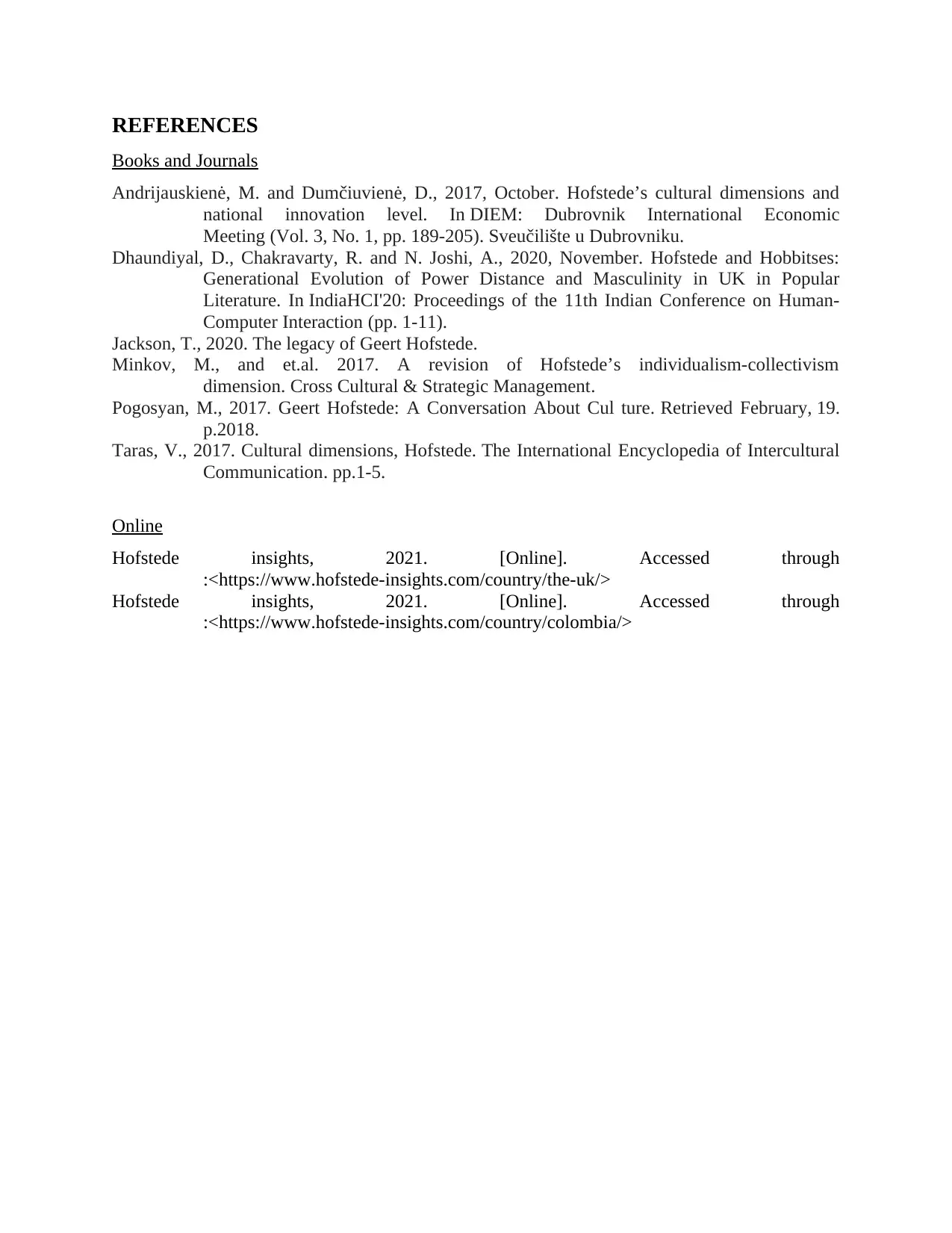
REFERENCES
Books and Journals
Andrijauskienė, M. and Dumčiuvienė, D., 2017, October. Hofstede’s cultural dimensions and
national innovation level. In DIEM: Dubrovnik International Economic
Meeting (Vol. 3, No. 1, pp. 189-205). Sveučilište u Dubrovniku.
Dhaundiyal, D., Chakravarty, R. and N. Joshi, A., 2020, November. Hofstede and Hobbitses:
Generational Evolution of Power Distance and Masculinity in UK in Popular
Literature. In IndiaHCI'20: Proceedings of the 11th Indian Conference on Human-
Computer Interaction (pp. 1-11).
Jackson, T., 2020. The legacy of Geert Hofstede.
Minkov, M., and et.al. 2017. A revision of Hofstede’s individualism-collectivism
dimension. Cross Cultural & Strategic Management.
Pogosyan, M., 2017. Geert Hofstede: A Conversation About Cul ture. Retrieved February, 19.
p.2018.
Taras, V., 2017. Cultural dimensions, Hofstede. The International Encyclopedia of Intercultural
Communication. pp.1-5.
Online
Hofstede insights, 2021. [Online]. Accessed through
:<https://www.hofstede-insights.com/country/the-uk/>
Hofstede insights, 2021. [Online]. Accessed through
:<https://www.hofstede-insights.com/country/colombia/>
Books and Journals
Andrijauskienė, M. and Dumčiuvienė, D., 2017, October. Hofstede’s cultural dimensions and
national innovation level. In DIEM: Dubrovnik International Economic
Meeting (Vol. 3, No. 1, pp. 189-205). Sveučilište u Dubrovniku.
Dhaundiyal, D., Chakravarty, R. and N. Joshi, A., 2020, November. Hofstede and Hobbitses:
Generational Evolution of Power Distance and Masculinity in UK in Popular
Literature. In IndiaHCI'20: Proceedings of the 11th Indian Conference on Human-
Computer Interaction (pp. 1-11).
Jackson, T., 2020. The legacy of Geert Hofstede.
Minkov, M., and et.al. 2017. A revision of Hofstede’s individualism-collectivism
dimension. Cross Cultural & Strategic Management.
Pogosyan, M., 2017. Geert Hofstede: A Conversation About Cul ture. Retrieved February, 19.
p.2018.
Taras, V., 2017. Cultural dimensions, Hofstede. The International Encyclopedia of Intercultural
Communication. pp.1-5.
Online
Hofstede insights, 2021. [Online]. Accessed through
:<https://www.hofstede-insights.com/country/the-uk/>
Hofstede insights, 2021. [Online]. Accessed through
:<https://www.hofstede-insights.com/country/colombia/>
⊘ This is a preview!⊘
Do you want full access?
Subscribe today to unlock all pages.

Trusted by 1+ million students worldwide
1 out of 9
Related Documents
Your All-in-One AI-Powered Toolkit for Academic Success.
+13062052269
info@desklib.com
Available 24*7 on WhatsApp / Email
![[object Object]](/_next/static/media/star-bottom.7253800d.svg)
Unlock your academic potential
Copyright © 2020–2026 A2Z Services. All Rights Reserved. Developed and managed by ZUCOL.





